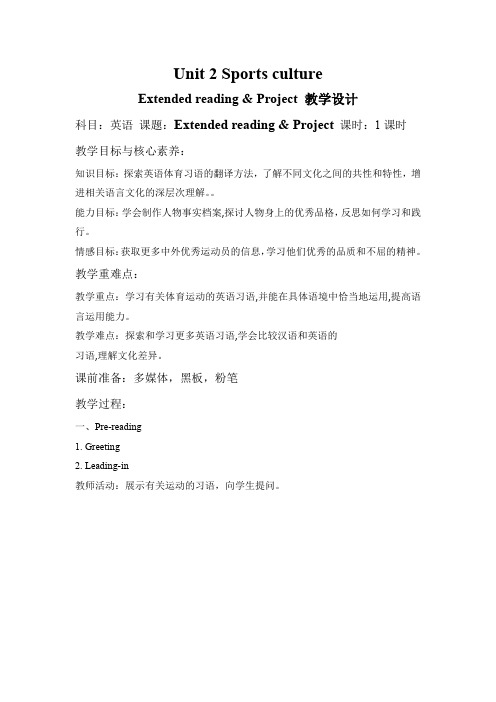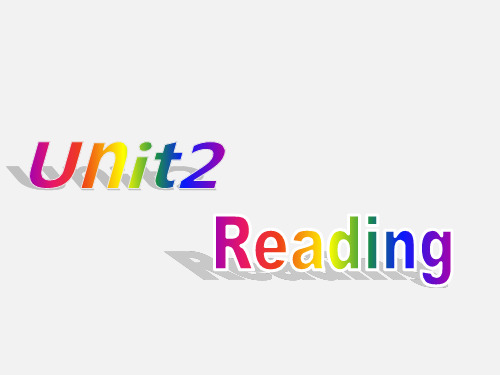unit 2 additional reading
- 格式:ppt
- 大小:288.50 KB
- 文档页数:12



Unit 2 Sports cultureExtended reading & Project 教学设计科目:英语课题:Extended reading & Project课时:1课时教学目标与核心素养:知识目标:探索英语体育习语的翻译方法,了解不同文化之间的共性和特性,增进相关语言文化的深层次理解。
能力目标:学会制作人物事实档案,探讨人物身上的优秀品格,反思如何学习和践行。
情感目标:获取更多中外优秀运动员的信息,学习他们优秀的品质和不屈的精神。
教学重难点:教学重点:学习有关体育运动的英语习语,并能在具体语境中恰当地运用,提高语言运用能力。
教学难点:探索和学习更多英语习语,学会比较汉语和英语的习语,理解文化差异。
课前准备:多媒体,黑板,粉笔教学过程:一、Pre-reading1. Greeting2. Leading-in教师活动:展示有关运动的习语,向学生提问。
What do you know about them?Can you understand them at the first sight?二、While- reading教师活动:让学生阅读文章,找出习语,归纳其意思。
教师活动:让学生用习语造句。
They seem to move the goalposts every time I meet the conditions which are required.好像每当我达到规定条件时,他们就改变规则。
His team scored an own goal when they played against Argentina.他的球队在与阿根廷队比赛时踢进了一个乌龙球。
I will call today to get a ballpark estimate of the cost.我今天会打电话来大致估算一下修车的费用If we believe ourselves, then we can still have peace and joy even when life throws us a curveball.如果我们相信自己,那么即使当生命中有突如其来之事发生时,我们仍能拥有平安和喜乐。



Book 2 Unit 2 The Olympic GamesA Teaching Plan for Reading一、Teaching content: Reading: An Interview二、Teaching time: 40 mins三、Teaching aims:1. Knowledge aim:Get students to know the similarities and differences about ancient and modern Olympic Games.2.Ability aim:Develop students’ reading ability and practice fast reading, careful reading and discussion.3.Emotional aim:Arouse students’ great interest in the Olympic Games.四、Key and difficult teaching points:1.Have a good understanding of the interview through the exercises.2.Get the students to learn different reading skills.五、Teaching methods:1.Group work2. Task-based Language Teaching六、Teaching aids:Multimedia and a blackboard七、Teaching procedures:Step1 Pre-reading1.Greeting2.Lead-in(1)Lead in the new content by showing pictures about the Olympics. (2)Let students know about some new words.Step2 While-reading1. Fast reading:Read the interview fast and get the main idea of the interview.2. Careful reading:Read the interview carefully and find out the detailed information. Step3 Post-readingplete the summary of the text.2.Make an interview about the Olympic Games.八、Homework1. Review the interview.2. Pick out the difficult words, expressions, sentence patterns .Book2 Unit2 The Olympic Games ( Reading )导学案一、Fast reading:Read the interview fast and get the main idea of the interview.This interview is mainly about ____.A. A magic journey by Pausanias.B. The similarities and differences about the ancient and modern Olympics.C. The ancient Olympic Games in Greece.二、Careful reading:(一)Read the interview carefully and choose the best answers.1. Pausanias was _____.A. a wrier who lived in “Ancient Greece”B. an English writer 2,000 years agoC. a writer who wrote about the modern Olympic gamesD. an athlete2. How often are the Winter Olympics held?A. Every years.B. Every other year.C. Every three years.D. Every four years.3. Where do all the competitors live?A. A hotel.B. A special village.C. A restaurant.D. A place hired by competitors.4. Which of the following statement is TRUE?A. Greek slaves and women could take part in the ancient Olympics in Greece.B. It is easy to win the right to host the Olympics.C. Almost every country wants to host the Olympics.D. It costs little to host the Olympics.5. Which of the following events isn't included in the Summer Olympic Games?A. Running races.B. Sailing.C. Swimming.D. Ice skating.(二)Find out the similarities and differences between ancient and modern Olympics.Similarities:1. ______ are allowed to take part in both in ancient and modern Olympics.2. The athletes compete not for money but for _______.3. The mottos are the same. They are______ , _______ and _______. Differences:Ancient Olympics Modern OlympicsEvents Only a few 4. ____________________Host country 5. __________________ From all over the world Prize 6. __________________ medals三、Post-reading1. Complete the summary of the text.The Olympic Games are the biggest sports meeting in the world, which include two kinds, the (1)________and the Winter Olympics. Both of them are (2)______ every four years. All countries can(3)______ part iftheir(4) __________ are good enough to the games.Women are not only allowed to join in but playing a very important role.A special village is built for the(5)____________ to live in, some stadiums(6)_____competitions, a large swimming pool, and a gymnasium as(7) ______.It’s a great honour to(8)_ ______the Olympic Games. The Olive wreath has been (9)_________ by medals. But it’s still about being able to run (10) _______, jump higher and throw further.2. Make an interview. Suppose you are a reporter, and do an interview about the Olympics.You can ask the following questions or other questions about Olympics:(1) How often are the Olympics Games held?(2) What's the motto of the Olympics?(3) Where was the 2008 Olympics Games held?(4) Who was China's first gold medal winner and for what event?四、Homework(1) Review the interview.(2) Pick out the difficult words, expressions, sentence patterns .。
Unit 1 Lights, camera, action 1.3Extended reading & Project”、知识点01目标词汇1.原文:In 1976, Disney adapted the book into a cartoon film…在1986年,迪士尼将这本书改编成卡通电影。
(教材P6)adapts改编,改写;使适应阮适应adaptable adj.适合的;能适应的;可修改的adaptation.适应;改编;改编本,改写本【用法】(1 )adapt sth. from根据改编某物be adapted for为而改写/改编(2)adapt oneself to使某人自己适应adapt... to...使适应adapt to适合;适应【链接高考】(2020 江苏卷)Adapted in imaginative ways, many have reappeared on city streets and village greens housing liny cafes, cellphone repair shops or even defibrillator machines (除颤器).经过创造性改造后,很多(亭)重新出现在城市街道和乡村广场上,里面有小咖啡馆、修理店,甚至还有除颤机器。
(2016 全国卷I) Today all three generations regard the move as a success, giving them a closer relationship than they would have had in separate cities.今天,这三代人都认为搬家是成功的,他们之间的关系比在不同的城市更亲密。
(2015 浙江卷)We are diumal creatures, with eyes adapted to living in the sun's light.我们是白天活动的动物, 眼睛能适应太阳的光线。
Module 1 Unit1 Traveling around China一、单元分析(Unit Analysis)(一)单元地位(Unit Position)1.本单元通过课文介绍不同的交通方式以及其各自的优缺点。
通过本课的学习, 学生能够学会描述并且比较各项交通方式,以及它们各自的优缺点,适当的加以分析。
2.了解我国各地的名胜的英语译名,学习与旅游有关的一些日常交际对话。
3.本课中出现名词性从句。
本单元主要学习名词性从句在复合句中充当主语,宾语,表语和同位语。
其引导词有连词(that, if , whether),连接代词(who, what, which, whose, whom),连接副词(where, when, why, how)等;主语从句;宾语从句。
(二)单元目标(Unit Target)1 了解名词性从句,在复习宾语从句的基础上进一步渗透名词性从句的概念。
2 能够谈论几种不同的modes of transportation,并且加以比较。
3初步尝试“自助游”设计。
4习得应用文中关于表格填写的基本技能, 能够正确填写表格。
(三)单元重点(Unit Points)1. Vocabulary File交际功能类1)交通方式: by train, by bus, by boat, by air, by bicycle 2)中国名胜:the Great Wall, the Three Georges, the Forbidden City, Jin Mao Building (Tower), the West Lake, the Mogao Caves,2 功能:Talking about modes of transportation 参考课本第14页 Useful LanguageBy air◆Are there any planes to Tokyo next Monday?◆How long does the flight take?◆How much is the fare / the round trip / a one-wayticket?◆May I enquire about the departure time?◆What’s the fare to Paris?◆Air tickets on holidays are heavily booked, aren’tthey?By bus◆Can I get to Seventh Street on this bus?◆Does this bus go downtown?◆How many stops are there to the Subway?◆The bus leaves every half hour on the hour.◆You’ll have to change for the No. 20 bus at People’sSquare.◆Does the bus go round-the-clock?By train◆From which platform does the Kunming train leave?◆It’s an express / a non-stop train to Beijing.◆The booking office usually sells tickets three daysin advance.◆Is there a restaurant car on the train?◆What time is the train from Beijing due to arrive?◆Do students enjoy half price on summer or wintervacation?3 语法点:本课出现了名词性从句,应作为本课的教学重点。